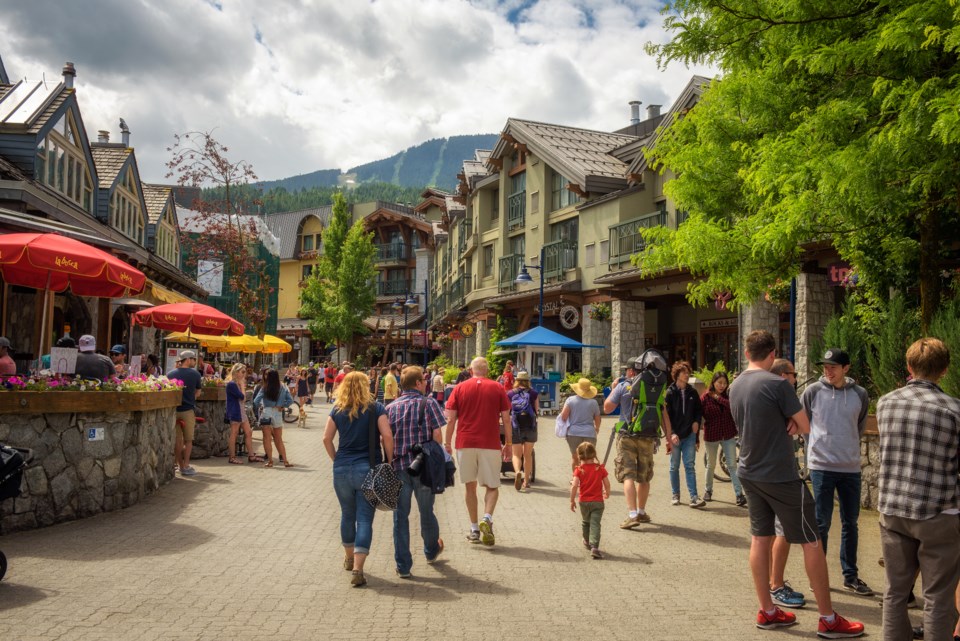Whistler’s first-quarter financials show strong revenue performance and increasing investment income, but also reveal a growing gap between project spending and long-term financial sustainability.
Carlee Price, the Resort Municipality of Whistler’s (RMOW) chief financial officer, presented the unaudited Q1 report to council on July 22. As of March 31, the municipality had achieved 108 per cent of its projected revenue for the quarter, while operating expenditures across all divisions came in at 90 per cent of budgeted levels.
“The overall results are quite strong,” said Price. “But we’re also seeing increasing pressure on our reserves, particularly as our project delivery accelerates.”
MRDT revenue shows signs of recovery
The report showed a 9.5-per-cent increase in Municipal and Regional District Tax (MRDT) revenues compared to the same period in 2024, with the Online Accommodation Platform (OAP) portion rising significantly, despite some volatility.
“First quarter MRDT was above a year ago levels. This is the first time that we've been able to say this in a while, and that trend appears to be moderating,” Price said.
She added core MRDT, which is influenced by hotel pricing and bookings, remains beyond the municipality’s control, while parking revenue—up 9.1 per cent year-over-year—is a more direct policy tool.
Occupancy in day lots remained strong through the ski season, which supported revenues in both Q4 2024 and Q1 2025, according to Price’s report.
Parking rates, managed by the RMOW, are intended to fund operations, support Whistler’s climate goals and fund public transit, while still accommodating commuter traffic.
Operating revenues up, but tipping fees and user fees drop
Program and admissions revenue, including Meadow Park Sports Centre, cross-country skiing, and the Olympic Plaza ice rink, outperformed expectations, as did building permit revenues, which exceeded Q1 2024 levels and helped reduce reliance on property taxes.
Transit revenues rose compared to last year but came in slightly under budget. However, user fee revenue was down, largely driven by a decline in tipping fees at the landfill.
Price cautioned that some timing issues—such as invoices or renewals being posted to the second quarter instead of the first—may have affected results across departments.
Project delivery surges—and outpaces funding
The RMOW spent $3.1 million on projects in Q1—7.7 per cent of the $39.1 million project budget. That’s more than double the five-year Q1 average of 3.3 per cent.
“We're spending at a much higher rate on projects, which is great news for the assets in our community—and slightly less great news for the financial standing of this community,” Price told council.
Project categories showing the highest delivery included asset maintenance and utilities work, with spending at 11.8 and 10.9 per cent of budget, respectively.
However, she warned contributions to reserves still fall “well short” of what’s needed to support the current rate of asset renewal.
“So while it's great news for our assets that we're spending on upkeep, we're spending on repair and replace, it also presents a challenge that we are not, at this time, adequately funding that level of spending,” she said. “The second step in that process is to collect the right amount in tax revenue from the community to fund that sector.”
Councillor Arthur De Jong asked whether project costs would naturally decline after periods of heavy investment.
Price responded that while some cyclical relief happens in utilities spending, general capital expenditures do not follow the same pattern.
“There’s no natural catch-up in general capital spending,” she said. “We can't just keep doing what we're doing and expect a good result.”
De Jong also asked whether projects could be paused in the event of “an acute financial challenge.”
“There’s a service-level price to be paid for denying regular repair and replacement,” said Price. “You could stop replacing things, but you can’t expect them to continue functioning at their current level if you starve them of capital.”
Council discusses amenity pricing, investment gains
Coun. Ralph Forsyth asked whether the RMOW had mechanisms in place to update pricing for popular services.
Karen Elliott, general manager of community engagement and cultural services, said the latest community budget survey showed some tolerance for fee increases at tourist-oriented sites like Lost Lake and Whistler Olympic Plaza, but less flexibility at Meadow Park Sports Centre.
“Our locals seem to be shifting to pass products versus day passes,” she said. “We’re always trying to balance affordability and cost recovery.”
Investment income came in strong at $1.09 million—139 per cent of what was budgeted—but Price expects that figure to normalize over the remainder of the year.
The RMOW’s long-term investment holdings totalled $58.4 million at the end of Q1, with a portfolio focused on fixed-income assets held to maturity.
Forsyth noted the cyclical nature of municipal finances and reminded council reserves ultimately come from one source: taxpayers.
“Raising taxes really high to cover reserves is wildly unpopular,” he said. “So just be cautious—especially in an election year.”




